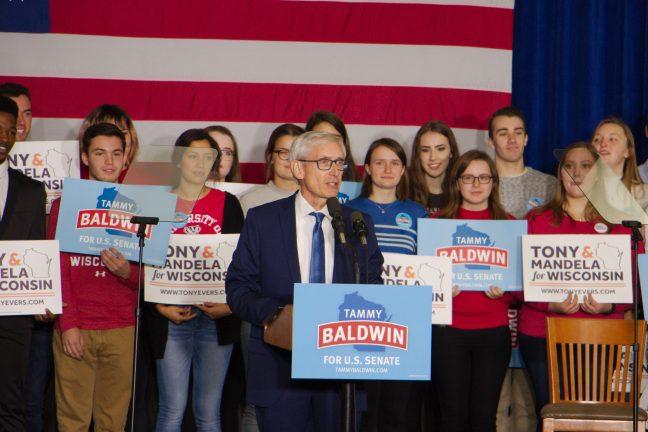Wisconsin income inequality has been rising for over five decades. Left unattended by policy-makers, it will only get worse.
A 2017 report from the Wisconsin Budget Project and the Center on Wisconsin Strategy showed that the top 1 percent of earners made, on average, 19 times what an average earner in the lower 99 percent did. The average earner in the top 0.1 percent made nearly 400 times the average of the lower 99 percent.
The economic consequences of this level of income inequality are disastrous. When the richest members of society take a continually-growing share of all income, they leave a smaller piece of the economic pie for everyone else, deepening economic insecurity and stifling people’s chances for social mobility.
Income inequality isn’t just undesirable because it negatively affects society — it’s a social and moral injustice. Let’s suspend reality for a moment and pretend that capitalism is benevolent, or at least that it works the way economists say it does.
Theoretically, wages are the way capitalist society distributes what it owes to its members. When workers work, they are justly compensated based on how productive they are. When worker productivity rises and wages don’t follow suit, it indicates that workers aren’t being justly compensated for their labor, and work without fair compensation or viable employment alternatives is always unjust. Remember, top earners aren’t working more or working harder, they’re just receiving a larger slice of the economic pie.
Back to basics: Would a $15 minimum wage really benefit Wisconsinites?
It isn’t only that income inequality has horrible social and economic effects. Inequality is itself an effect of a political system designed to safeguard the disproportionate wealth of society’s richest members. Wisconsin’s public policy decisions reflect this reality.
Our tax system, for instance, has consistently benefited the richest more than the lower- and middle-classes. The top 1 percent of earners pay the smallest share of their income — 7.7 percent — in taxes. Compare this to the 9 percent that the bottom 20 percent of earners pay, or the 10.6 percent that the middle 20 percent pays.
The tax cuts passed by Wisconsin’s Republican-dominated legislature and enacted by Gov. Scott Walker between 2011-16 largely benefit the wealthiest of the state’s residents. A Wisconsin Budget Project analysis showed that during this window, the tax cut to the top 1 percent was nearly 11 times larger than the combined tax cut that went the bottom income quintile.
By passing right-to-work laws and inhibiting collective bargaining, the Wisconsin government has stripped power from unions, the entities that have traditionally protected the rights and wages of workers. Economists David Autor, Alan Manning and Christopher Smith wrote in an American Economic Journal report that the reduced bargaining power of unions has been one of the largest contributors to rising income inequality in the U.S.
Thankfully, Gov. Tony Evers’ 2019-21 executive budget proposal includes a few policies that directly address income inequality. The proposed changes to the tax system help reduce income inequality by expanding tax cuts for low- and middle-income earners and closing tax loopholes that benefit the wealthiest earners and industries.
Raising minimum wage is Amazon’s way to stop employee unionization
On the taxation side, the proposal calls for expanding the Earned Income Tax Credit, a federal income credit directed at working parents and improving the Homestead Credit, which offers property tax relief to low-income households. Evers’ signature middle-class tax cut would give 1.9 million Wisconsin tax-filers an average of $217, money that will be spent back into Wisconsin communities. While these programs are no substitute for real wage growth, they are the tools Evers has to bring some relief to lower and middle-class Wisconsinites.
The proposal also closes tax loopholes that have long been skewed in favor of the state’s richest residents. Crucially, the budget would tax income from wealth, or capital, at the same rate as income from work. Wisconsin is one of the few states that taxes capital gains (that is, income earned from wealth) at a lower rate than income earned from work. Since it is the highest earners, the top 1 percent and 0.1 percent, who receive the highest share of their income from wealth, this decision would directly impact the exponential growth of their incomes.
The budget also proposes closing the tax break for private school tuition, which allows residents to subtract the tuition they owe private institutions before filing their taxes. According to an investigation by the Wisconsin State Journal, two-thirds of the value of these credits were going to the state’s top tax-filers.
The budget’s proposed minimum wage increase — to $10.50 by 2023 — would start addressing income inequality by making wages more accurately reflect worker productivity. For example, there’s strong evidence to suggest since 1979, the increase in inequality between women in the middle and bottom of the wage distribution is in large part the result of a failure to increase minimum wages. This minimum wage increase doesn’t go nearly far enough ensure that Wisconsin workers are justly compensated and receiving their fair share of the state’s economic pie, but it’s a start.
The Evers administration should continue to advocate policies that reduce income inequality and ensure economic security for all Wisconsinites — anything less is a social and moral injustice.
Sam Ropa ([email protected]) is a senior majoring in geography and anthropology.





















